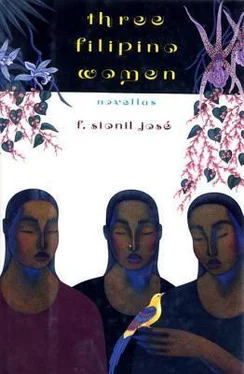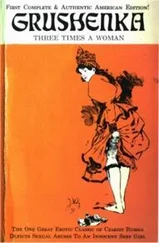Francisco Jose - Three Filipino Women
Здесь есть возможность читать онлайн «Francisco Jose - Three Filipino Women» весь текст электронной книги совершенно бесплатно (целиком полную версию без сокращений). В некоторых случаях можно слушать аудио, скачать через торрент в формате fb2 и присутствует краткое содержание. Год выпуска: 2013, ISBN: 2013, Издательство: Random House Publishing Group, Жанр: Современная проза, на английском языке. Описание произведения, (предисловие) а так же отзывы посетителей доступны на портале библиотеки ЛибКат.
- Название:Three Filipino Women
- Автор:
- Издательство:Random House Publishing Group
- Жанр:
- Год:2013
- ISBN:978-0-307-83028-9
- Рейтинг книги:4 / 5. Голосов: 1
-
Избранное:Добавить в избранное
- Отзывы:
-
Ваша оценка:
- 80
- 1
- 2
- 3
- 4
- 5
Three Filipino Women: краткое содержание, описание и аннотация
Предлагаем к чтению аннотацию, описание, краткое содержание или предисловие (зависит от того, что написал сам автор книги «Three Filipino Women»). Если вы не нашли необходимую информацию о книге — напишите в комментариях, мы постараемся отыскать её.
and
-examine the Philippine experience through the lives of three female characters, a prostitute, a student activist, and a politician.
Three Filipino Women — читать онлайн бесплатно полную книгу (весь текст) целиком
Ниже представлен текст книги, разбитый по страницам. Система сохранения места последней прочитанной страницы, позволяет с удобством читать онлайн бесплатно книгу «Three Filipino Women», без необходимости каждый раз заново искать на чём Вы остановились. Поставьте закладку, и сможете в любой момент перейти на страницу, на которой закончили чтение.
Интервал:
Закладка:
I found it a bit incongruous that I should be working on the rural problems and the family structure of the Philippines in New England when I should have been doing something more original and creative like studying the blacks or even the simpler case of old-timers in Hawaii and the West Coast who were never assimilated into the American mainstream. Filipinos working for their Ph.D.’s in America should study America — otherwise there is no sense in going there, just as Americans working on their Ph.D.’s come to the Philippines for their fieldwork. But there is always a special aura to having an American Ph.D. and we must pay for that aura.
I was very much surprised one afternoon when Narita appeared at my boardinghouse. She was big with child but even though bloated, she looked lovely.
“Eddie, you snob,” she said the moment she came in. I glanced at the big car, a Continental, that was parked in the street and inside was an aging mestizo whom I recognized at once. He had a Filipino driver up front.
“Isn’t that the ambassador?”
“Yes, darling,” she said, taking my hand and taking me inside my cluttered room.
“Well, ask him in. I don’t mind …”
“No, darling,” she said sweetly. “Let him wait. After all, I just asked him for a lift so that I could see you.”
“All the way from New York?”
She smiled and closed the door behind her.
I had known of Lopito’s death two or three years before. Looking at her big belly, I said, “That’s progress. So you got married again.”
“Ummmm.”
“I would like to meet him. Is he in New York with you?”
She tweaked my nose. “You poor dear — so behind the gossip. This is my second. And the father — well, it’s that poor man outside waiting for us to finish our small talk.”
“You mean the ambassador?”
“Darling, certainly not the driver! Didn’t you know?”
I shook my head. She took everything with amusement. “And tell me, how is your dissertation coming along? The other evening, your adviser was in New York, in my house for dinner. Did you know that? I’ve met a few people. I have dated quite a few interesting men. A certain John F. Kennedy—”
“Really now,” I said. Narita was never a braggart. She was just stating a fact.
“Well, it is a long way from Santa Ana, isn’t it?” she said. She asked me about my sisters and my parents, how the old town was. She had not been there since her marriage to Lopito but she had dispatched an engineer to build a house, right where the old house stood, so that her mother would have something better to live in.
Long after she left, I wondered what on earth she had come to see me for. I decided to take up her invitation and that December, shortly before Christmas, I went to visit her.
It had already begun to snow in Boston, the last golden leaf of maple had fallen, and a bleakness was all over the landscape. It was an unusually warm December afternoon when I got to the Greyhound bus station on Forty-second Street and because I just had a small weekender suitcase, I decided to walk to her house on Sixty-eighth Street. It was a good, invigorating walk up Fifth Avenue with its Christmas decor, the smell of roasting chestnuts in the air. I paused briefly at the Rockefeller Plaza where ice skaters were showing off.
Her house was in a residential area on the East Side, a short walk from Central Park, a neighborhood of walk-ups and boutiques. She was expecting me, and she answered the doorbell. Narita, I saw again, was beautiful, her hair falling down her shoulders, her lips red though without a touch of lipstick. She embraced me warmly and gave me another of those full, wet kisses. She smelled of cologne and freshness and all the wonderful scents I remembered of her. She was slim again and she said, “Yes, I had a boy. I have two boys now. Want to see them?”
She took me to the basement which was prettied up into a nursery. I noticed at once that the older boy was dark and the newborn was, like her and Iturralde, very fair.
She smiled at me, divining my thoughts, and pinched me on the side. “I will tell you everything,” she said.
The house had four storeys including the basement. The ground floor opened to a narrow garden which she had done with rocks, evergreens and huge clam shells from the Philippines. A wisteria filled the other end. I could imagine how beautiful it would be all lighted up for some evening party. Nothing ostentatious about the house although the furnishings were expensive, the beige leather sofas, the Afghan rugs, the soft blue velvet drapes. She had an Albers, two Pollocks, plus her paintings from the Philippines, santos , and antique china which would cost a fortune in New York as they already did in Manila. She had three full-time Filipino maids, one a registered nurse who looked after the babies and the house. They occupied two of the rooms in the basement and had their own entrance.
Narita had prepared pinakbet which I was not particularly fond of, but the fact that she had cooked it herself, touched me. She ate a little for she would be going out that evening to a dinner. She would miss the cocktails but since it was close by, she would have more time with me. I wanted to ask many questions but I didn’t have to; she was telling me many things and at the same time asking me about Santa Ana.
“I am not going to be his mistress forever,” she said finally. “His wife won’t divorce him. But even if she did, I won’t marry him. He is a wonderful, thoughtful man — and he has given me all the love and attention that someone in his position can give. He is also a very lonely man, a very misunderstood man, and I love him very much.”
“What is love to you now, Narita?”
I had not meant the question to be so crude.
She was holding the silver spoon and had just ladled out another spoonful of the vegetable stew into my plate. We were in her dining room, before that finely carved rosewood table with the silver candelabra and its four unlighted candles and lace tablecloth.
I had already taken off my jacket and was very comfortable in my turtleneck sweater. I had even shucked off my shoes and had really made myself at home.
“Do not ask me to make definitions,” she said sharply. “Look at me, what I do, how I react. What are words?”
“Extensions of our thoughts.”
“But they could be different from what we do. And I want to do a lot, to live a lot. I also know where I am headed. I have two boys — but that’s not enough. I could live for them, but what do we live for anyway? You ask me what love is, you may just as well ask why I am alive …”
I had not intended to get into a philosophical discussion only to get lost in a maze of contradictions, but she was doing the talking. “We all grow up,” she said. “Or am I presuming things?”
I held her hand.
“Did you know that I have an M.A. in Far Eastern studies from Columbia?”
I had heard about her studying, but the degree surprised me — not that she did not have the talent for it but that she had the perseverance.
“It is always fun, trying to learn more.” She spoke humbly. Then, “But some men — all they want out of life really is sex, and after that is over, you have to talk a bit, right?”
I smiled in agreement.
“I have had my fill of that type. In fact, one of them is the father of my older boy. You looked surprised when you saw him … He was an aide of Papa,” she explained simply. “He was a military type, you know, chest out, chin in, all muscle and no brain. Oh, it was a wonderful, physical relationship, all the orgasms that I had read about but never knew till I met him. But he was a stud — nothing more, just a stud, and how boring he could get after he was used!”
Читать дальшеИнтервал:
Закладка:
Похожие книги на «Three Filipino Women»
Представляем Вашему вниманию похожие книги на «Three Filipino Women» списком для выбора. Мы отобрали схожую по названию и смыслу литературу в надежде предоставить читателям больше вариантов отыскать новые, интересные, ещё непрочитанные произведения.
Обсуждение, отзывы о книге «Three Filipino Women» и просто собственные мнения читателей. Оставьте ваши комментарии, напишите, что Вы думаете о произведении, его смысле или главных героях. Укажите что конкретно понравилось, а что нет, и почему Вы так считаете.












